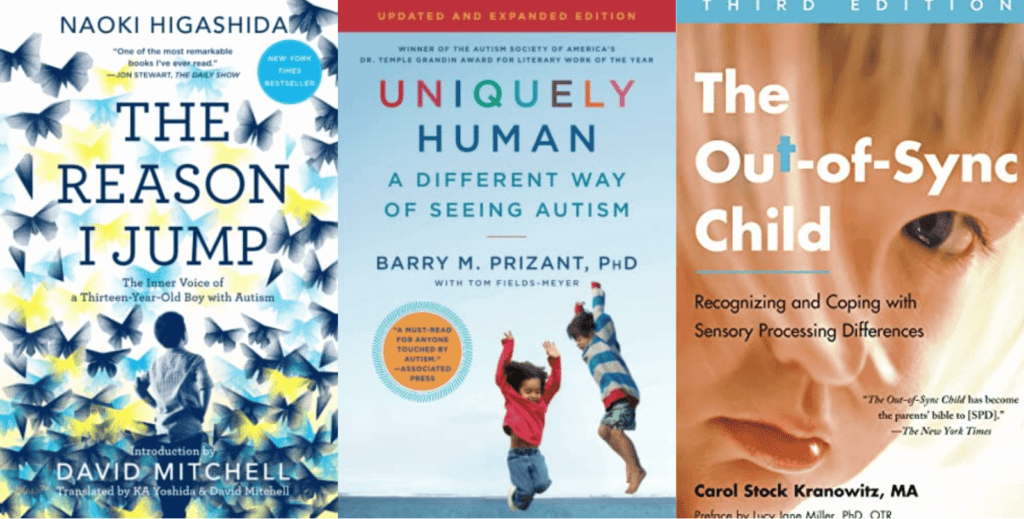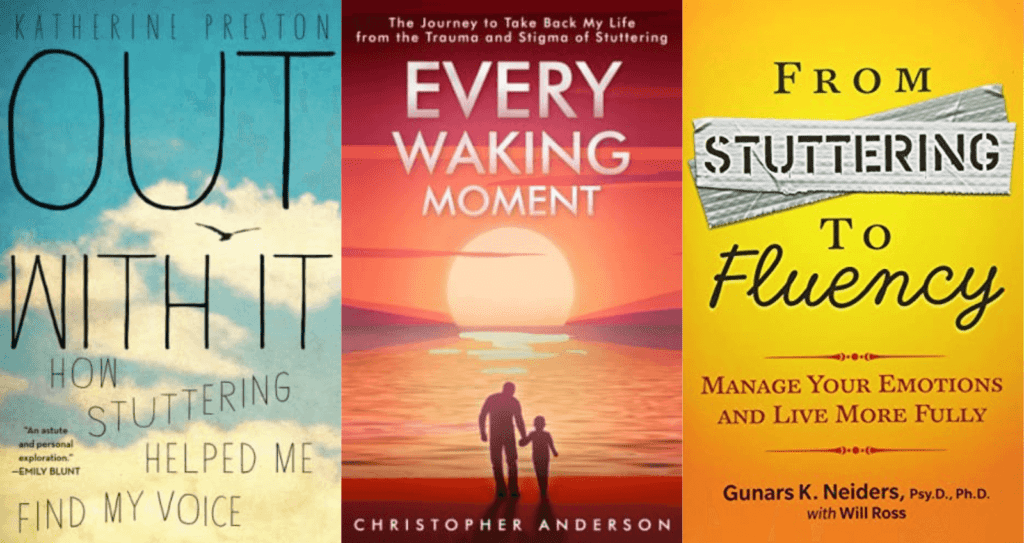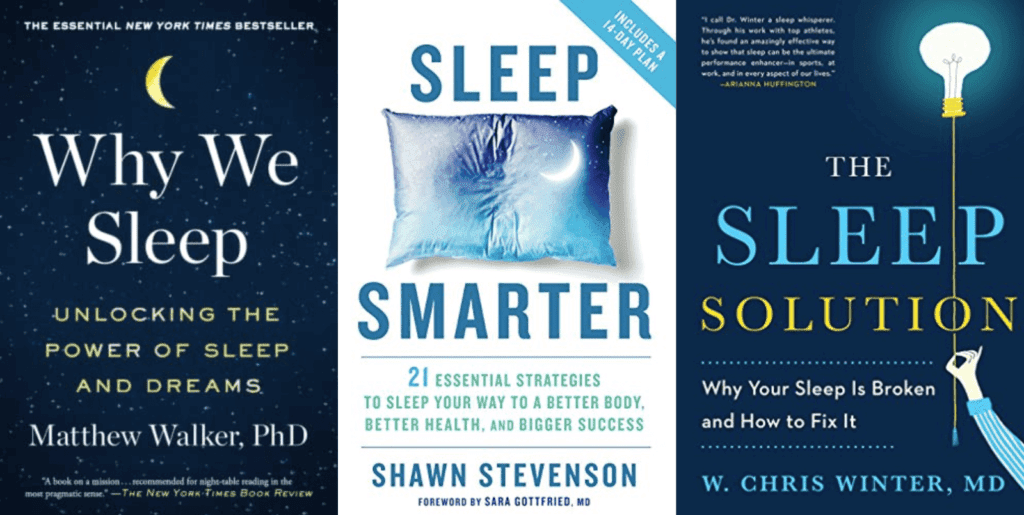The following are some of the best autism books for parents.
- Best Autism Books For Parents
- 1. The Reason I Jump
- 2. Uniquely Human
- 3. Ten Things Every Child with Autism Wishes You Knew
- 4. Women and Girls with Autism Spectrum Disorder
- 5. A Parent’s Guide to High-Functioning Autism Spectrum Disorder
- 6. Navigating Autism
- 7. Parenting a Child with Autism
- 8. An Early Start for Your Child with Autism
- 9. The Out-of-Sync Child
- 10. Beyond Behaviors
- How Autism Books for Parents Can Help
- Conclusion
Disclosure: Some of the links below are affiliate links. This means that, at zero cost to you, I will earn an affiliate commission if you click through the link and finalize a purchase.
Best Autism Books For Parents

1. The Reason I Jump
By Naoki Higashida
Written by Naoki Higashida, a very smart, very self-aware, and very charming thirteen-year-old boy with autism, it is a one-of-a-kind memoir that demonstrates how an autistic mind thinks, feels, perceives, and responds in ways few of us can imagine. Parents and family members who never thought they could get inside the head of their autistic loved one at last have a way to break through to the curious, subtle, and complex life within.
Related: Autism In Women Symptoms That Are Often Overlooked

2. Uniquely Human
By Barry M. Prizant
Autism therapy typically focuses on ridding individuals of “autistic” symptoms such as difficulties interacting socially, communication problems, sensory challenges, and repetitive behavior patterns. Now, this updated and expanded edition of Dr. Barry M. Prizant’s Uniquely Human tackles new language such as shifting from “person-first language” to “identity-first language,” diversity of identity in the autism sphere, and the future of autistic advocacy by amplifying the voices of autistic and neurodivergent individuals.
Related: Top +40 Autism Self Help Skills For Adults That Will Make Life Less Stressful (+FREE ASD Resources)

3. Ten Things Every Child with Autism Wishes You Knew
By Ellen Notbohm
A child’s voice leads into each chapter, offering a one-of-a-kind exploration into how ten core characteristics of autism affect our children’s perceptions and reactions to the surrounding physical, sensory and social environments. This revised and updated third edition sharpens the focus on these basic aspects while expanding on how our own perspectives shape the life of our child and ourselves, today, tomorrow, and for years to come. An all-new section illuminates the surprising breadth of our power of choice and outlines potent strategies for strong decision-making in every situation.
Related: Shy Child Vs. Autism (& How To Parent A Child With Autism?)

4. Women and Girls with Autism Spectrum Disorder
By Sarah Hendrickx, Judith Gould
Outlining how autism presents differently and can hide itself in females and what the likely impact will be for them throughout their lifespan, the book looks at how females with ASD experience diagnosis, childhood, education, adolescence, friendships, sexuality, employment, pregnancy and parenting, and aging. It will provide invaluable guidance for the professionals who support these girls and women and it will offer women with autism a guiding light in interpreting and understanding their own life experiences through the experiences of others.
Related: Autism Resources For Adults (Information, Podcasts, TED Talks, Books)

5. A Parent’s Guide to High-Functioning Autism Spectrum Disorder
By Sally Ozonoff, Geraldine Dawson, James C. McPartland
Leading experts show how you can work with your child’s unique impairments–and harness his or her capabilities. Vivid stories and real-world examples illustrate ways to help kids with ASD relate more comfortably to peers, learn the rules of appropriate behavior, and succeed in school. You’ll learn how ASD is diagnosed and what treatments and educational supports really work. Updated with the latest research and resources, the second edition clearly explains the implications of the DSM-5 diagnostic changes.
Related: How To Help A Child With ADHD Focus Without Medication? Best 21 ADHD Self-Help Techniques

6. Navigating Autism
By Temple Grandin, Debra Moore
International best-selling writer and autist Temple Grandin joins psychologist Debra Moore in presenting nine strengths-based mindsets necessary to successfully work with young people on the autism spectrum. Examples and stories bring the approaches to life, and detailed suggestions and checklists help readers put them to practical use.
Related: Best 10 Books On ADHD For Parents

7. Parenting a Child with Autism
By Richard Bass
In Parenting a Child With Autism, here is just a fraction of what you will discover:
- The spectrum of ASD signs and symptoms, plus the most common ASD misconceptions
- What life is really like through the eyes of your autistic child
- How an ASD diagnosis is made, the specialists you may meet, and the support that is available
- The fascinating advancements in understanding autism and the brain – the longest nerve in your body may become your new best friend!
- How just 5 minutes a day can make all the difference
- Essential items that can help ASD children avoid meltdowns – fidgets and poppers really can help!
- 6 types of ASD treatments and therapies to help reduce symptoms and allow children to go about their daily lives
- How ADHD affects children with ASD, and how anxiety affects a child with ASD
- 20 games and activities you can do at home to start helping your child’s social skills without spending a dollar
- How to make an emotional thermometer and why this is going to help the entire family
- A FREE social interactions checklist to understand where your child needs a little extra help and support
And much more.

8. An Early Start for Your Child with Autism
By Sally J. Rogers, Geraldine Dawson, Laurie A. Vismara
This encouraging guide from the developers of a groundbreaking early intervention program provides doable, practical strategies you can use every day. Nearly all young kids—including those with ASD—have an amazing capacity to learn. Drs. Sally Rogers, Geraldine Dawson, and Laurie Vismara make it surprisingly simple to turn daily routines like breakfast or bath time into fun and rewarding learning experiences that target crucial developmental skills. Vivid examples illustrate proven techniques for promoting play, language, and engagement.

9. The Out-of-Sync Child
By Carol Stock Kranowitz
The Out-of-Sync Child offers comprehensive, clear information for parents, teachers, and professionals–and a drug-free treatment approach for children.
This revised edition includes expanded information about SPD “look-alikes,” including Learning Disabilities, ADHD, and autism; about diagnosis and treatments; and about other topics.

10. Beyond Behaviors
By Mona Delahooke
In Beyond Behaviors, internationally known pediatric psychologist, Dr. Mona Delahooke describes behaviors as the tip of the iceberg, important signals that we should address by seeking to understand a child’s individual differences in the context of relational safety.
Featuring impactful worksheets and charts, this accessible book offers professionals, educators and parents tools and techniques to reduce behavioral challenges and promote psychological resilience and satisfying, secure relationships.
How Autism Books for Parents Can Help
Autism books for parents can be incredibly helpful in providing information, guidance, and support for families who have a child with autism.
Here are a few ways in which these books can assist:
1. Understanding autism: Autism books provide valuable insights into the characteristics, behaviors, and challenges associated with autism spectrum disorder (ASD). They explain the neurodevelopmental aspects of autism and shed light on how it affects individuals in various ways.
2. Practical strategies: These books often offer practical strategies and techniques that parents can use to support their child with autism. They may include tips for fostering communication skills, managing sensory sensitivities, promoting social interactions, and addressing behavioral challenges.
3. Navigating the healthcare system: Autism books can provide information on the various professionals involved in ASD diagnosis and treatment, such as pediatricians, psychologists, therapists, and educators. By understanding the roles of these professionals, parents can better navigate the healthcare system and advocate for their child’s needs.
4. Emotional support: Raising a child with autism can sometimes feel challenging and overwhelming. Autism books for parents often offer emotional support by sharing personal stories, experiences, and coping strategies from other families who have gone through similar journeys. These stories can help parents feel less alone and provide reassurance that they are not the only ones facing these challenges.
5. Empowerment and advocacy: Autism books empower parents by providing them with knowledge and tools to become effective advocates for their child. They may educate parents about their rights within the education system, offer guidance on individualized education plans (IEPs), and provide resources for accessing appropriate services and support networks.
6. Building a sense of community: Autism books can connect parents with a wider community of caregivers who understand the unique joys and difficulties of raising a child with autism. Many books include recommendations for support groups, online forums, and organizations where parents can find additional resources and connect with others experiencing similar situations.
Conclusion
Autism books for parents offer a wealth of information, strategies, support, and empowerment.
They can help parents better understand their child’s needs, provide practical guidance, and foster a sense of community.
Ultimately, these books can play a crucial role in assisting parents as they navigate the journey of raising a child with autism.



